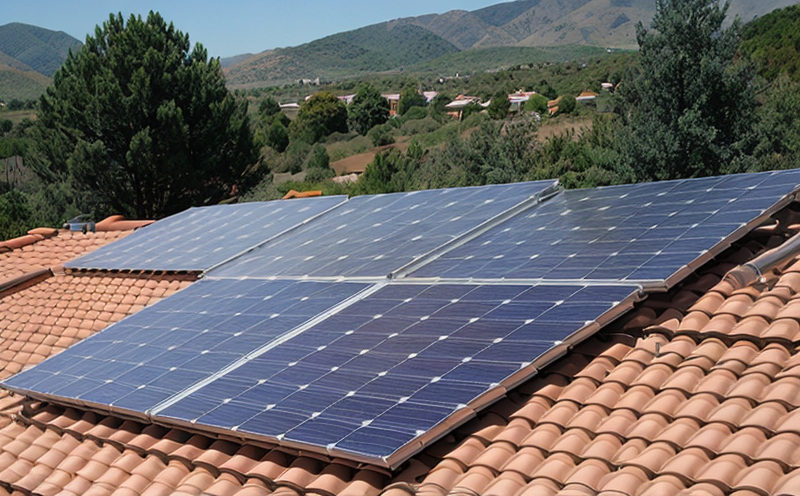Solar thermal systems certification and testing are crucial steps in ensuring that solar water heaters meet international standards for performance, safety, and durability. As the demand for renewable energy sources continues to grow, manufacturers must adhere to rigorous testing protocols to ensure their products meet the needs of consumers worldwide.
Overview of Solar Thermal Systems Certification
Solar thermal systems certification involves a comprehensive evaluation of a systems design, materials, and performance. This process ensures that solar water heaters are safe, efficient, and reliable. The certification process typically involves:
Testing and evaluation of the systems performance in accordance with international standards
Assessment of the systems safety features, such as temperature limits and pressure relief valves
Evaluation of the systems durability and lifespan
Verification of the systems compliance with local building codes and regulations
There are several organizations that provide certification for solar thermal systems, including:
International Organization for Standardization (ISO)
American Society for Testing and Materials (ASTM)
European Solar Thermal Industry Federation (ESTIF)
National Standards for Renewable Energy Sources (NSRES)
Key Components of a Certified Solar Thermal System
A certified solar thermal system must meet certain key requirements. Some of these include:
Thermal energy storage: The ability to store thermal energy generated during the day for use at night or during periods of low sunlight.
Heat exchanger: A device that transfers heat from one fluid to another, typically used in a solar water heater.
Pumping system: A network of pipes and pumps that circulate fluids through the system.
Here are some key components of a certified solar thermal system:
Collector: The component responsible for converting sunlight into heat. This can be either a flat plate collector or an evacuated tube collector.
Control system: The device that regulates the flow of fluid through the system, ensuring optimal performance and efficiency. The control system typically includes sensors, valves, and pumps to regulate the systems operation.
Key Benefits of Certification
Certification provides several key benefits to manufacturers, consumers, and regulatory bodies:
Increased credibility: Certification demonstrates a manufacturers commitment to quality and safety.
Improved market access: Certified products are more likely to be accepted by building authorities and consumers worldwide.
Reduced liability: Compliance with international standards reduces the risk of product failure or damage claims.
Detailed Explanation of Thermal Energy Storage
Thermal energy storage (TES) is an essential component of a certified solar thermal system. TES allows users to store thermal energy generated during the day for use at night or during periods of low sunlight. There are several types of TES systems, including:
Sensible heat storage: This type of storage involves heating a fluid to a high temperature, which is then stored in an insulated container.
Latent heat storage: This type of storage involves melting a phase-change material (PCM) that releases or absorbs heat energy as it changes state.
Cold thermal energy storage: This type of storage involves storing cold water in an underground tank during periods of low demand.
Here are some key considerations when designing a TES system:
Storage capacity: The amount of thermal energy stored is critical to ensure the system meets user requirements.
Insulation and containment: Effective insulation and containment systems are essential to prevent heat loss and maintain optimal performance.
Control systems: Accurate control systems must be implemented to regulate temperature, flow rates, and pressure.
Detailed Explanation of Heat Exchangers
Heat exchangers play a critical role in a certified solar thermal system. They transfer heat from one fluid to another, typically used in a solar water heater. There are several types of heat exchangers, including:
Plate heat exchangers: These heat exchangers use corrugated plates to facilitate heat transfer between fluids.
U-tube heat exchangers: These heat exchangers use U-shaped tubes to facilitate heat transfer between fluids.
Shell and tube heat exchangers: These heat exchangers use a series of tubes within a shell to facilitate heat transfer between fluids.
Here are some key considerations when designing a heat exchanger:
Heat transfer coefficient: The heat transfer coefficient determines the efficiency of heat transfer between fluids.
Pressure drop: A low pressure drop is essential to ensure efficient fluid flow and optimal performance.
Material selection: Selection of materials must consider corrosion resistance, thermal conductivity, and durability.
QA Section
Q: What are the benefits of certification for solar thermal systems?
A: Certification provides several key benefits to manufacturers, consumers, and regulatory bodies. It increases credibility, improves market access, and reduces liability.
Q: What is the purpose of thermal energy storage in a certified solar thermal system?
A: Thermal energy storage (TES) allows users to store thermal energy generated during the day for use at night or during periods of low sunlight.
Q: How do I select a suitable heat exchanger for my solar water heater?
A: Selection of materials must consider corrosion resistance, thermal conductivity, and durability. The heat transfer coefficient determines the efficiency of heat transfer between fluids.
Q: What types of testing are involved in certification of solar thermal systems?
A: Testing involves evaluation of performance, safety, and durability. It includes assessment of temperature limits, pressure relief valves, and insulation.
Q: Can I design a TES system using any type of storage material?
A: No, the selection of storage materials must consider factors such as specific heat capacity, thermal conductivity, and corrosion resistance.
Q: What are some common challenges associated with certification of solar thermal systems?
A: Some common challenges include compliance with international standards, ensuring safety features meet regulatory requirements, and achieving optimal performance and efficiency.
Q: Can I certify a solar thermal system using only one type of standard or testing protocol?
A: No, manufacturers must comply with multiple standards and protocols to ensure their products meet the needs of consumers worldwide.

































